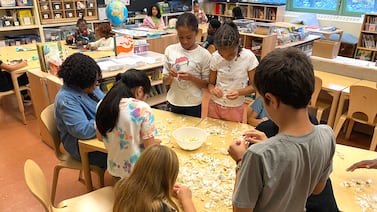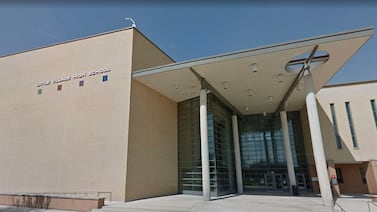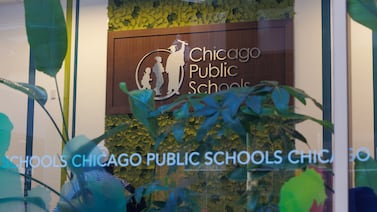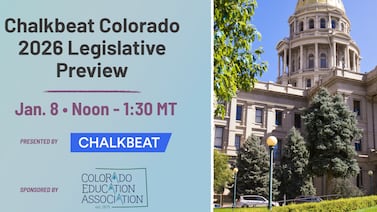Sign up for Chalkbeat Newark’s free newsletter to keep up with the city’s public school system.
The Newark Board of Education approved a $1.5 billion budget on Wednesday that includes an annual $30 tax increase to the average homeowner and $470 million allocated directly to schools and controlled by principals.
Similar to the 2023-24 school year budget, Newark Public School leaders said next year’s biggest expenses are payments to charter schools, hiring new teachers – including bilingual and special education teachers – and supporting academic initiatives such as tutoring, career and technical education programming, and new instructional platforms.
The 2024-25 school year spending plan is $187 million bigger than this year’s budget due in part to a record high $1.25 billion in state aid. That aid comes as the district – the largest in New Jersey – faces the end of its federal COVID relief funding and confronts costly demands in 2025 — such as providing services for more than 11,000 English language learners and roughly 7,000 students with disabilities, ongoing efforts to support student learning loss, a new teachers union contract, and facilities needs.
Typically, residents also cast their vote for the budget during the annual April school board election, but a new state law eliminated that requirement for the first time this year. Residents would vote on the budget if the district proposed a more than 2% increase in property taxes.
Newark’s spending plan is designed to support Superintendent Roger León’s 10-year plan known as “The Next Decade,” which enters its fifth year this coming school year. Next school year’s budget contains funding to continue and expand the initiatives in León’s plan and tackle emerging issues such as the need for additional attendance counselors. The district is also looking to secure “a more centralized location” for its truancy task force as Newark looks to bolster student attendance, said León during Wednesday’s budget hearing.
León said the pandemic “did not distract us from the mission and vision” outlined in his 10-year plan but rather helped reach the goals quicker.
“The budget is about a strategy and everyone’s best thinking,” León added.
State fully funds Newark, but district struggles with local share
Over the last several years, Gov. Phil Murphy’s administration gradually increased Newark’s state aid, with next year’s funding being the highest. Next school year, Newark will receive an additional $101 million in funding from New Jersey, making up 82.3% of the district’s budget. City taxes make up 9.3% of next school year’s budget, an excess fund balance makes up 7.7%, and other local and federal aid makes up the remaining 0.7%.
While the state has continued to fund Newark Public Schools, historically it has been one of the most underfunded school districts based on the state’s school funding formula, which uses a weighted student formula to give districts financial support in addition to local taxes.
“We have not caught up yet, but we are beginning to do so,” said Valerie Wilson, the district’s school business administrator.
The $1.25 billion in state aid next school year will also include $66 million for special education and $8.5 million for transportation costs. This year’s budget saw an $8.5 million increase in student transportation costs due to rising vendor rates, Wilson said on Wednesday. Those costs include money for student bus tickets and cards and transportation for students and students with disabilities.
Despite the 8.8% increase in state funding, district leaders say Newark remains $112 million under its local fair share of property taxes. Between 1987 and 2006 and again between 2022 and 2024, Newark schools did not raise property taxes.
The district also receives funding through federal and state grants, IDEA funds that support students with disabilities, and Title I funds that provide financial assistance to school districts with a high number of children from low-income families.
Charter school payments continue to grow
Newark school and community leaders have raised issues about the district’s rising payments to charter schools.
Next school year, the district is providing charter schools with $401 million, with $391 million paid directly to those schools for students. The publicly funded but privately managed charter schools educate roughly 18,000 Newark public school students, Wilson said. New Jersey law states that districts must send to charter schools at least 90% of per-pupil funds for students who live in the district.
Of the $401 million, $7 million covers transportation costs for those students, and just under $3 million is for out-of-district tuition for charter students sent to private schools for specialized services.
This school year, charter school payments made up the district’s second-largest expenditure at $353.8 million, an $11.8 million increase from the 2022-23 school year.
Boosts to academic initiatives support student recovery efforts
Last year, León said federal COVID relief dollars were the district’s “saving grace” in expanding summer programs to 14 schools, which offered tutoring in group and one-on-one learning settings.
Last summer, roughly 10,000 public school students were required to attend summer school – double the number from the previous year – highlighting the district’s work to support student academic recovery efforts after the pandemic. This summer, the programs “will be about moving kids forward,” said León on Wednesday.
“Our efforts to combat learning loss are still in full effect,” León added.
Next school year’s budget includes a $6.8 million increase in tutoring efforts previously covered by American Rescue Plan funds. Next school year, León also plans to boost high-dosage tutoring before and after school and continue with Saturday programs for high school and elementary students.
It will also include an extra $30.6 million for academic initiatives such as career and technical education programming, new instructional platforms, professional development for teachers, a virtual reality math program, and replacements of math and English language arts textbooks and novels.
New schools and updating aging facilities
The district currently enrolls roughly 41,000 students in 63 schools but León expects more students in the coming school year. This year’s budget also includes a $2.7 million increase to support new and expanding schools.
This fall, the district will open Branch Brook Elementary School and enroll students in pre-K to second grade, and expand one grade level the year after. The district will also increase one grade level at seven schools.
District leaders are also working with the state’s School Development Authority to build a new University High School. León is looking to open eight new schools with plans to open one in the North Ward and one in the East Ward in the years to come.
Next year’s budget includes an additional $41.4 million directly for school renovations and facilities projects such as new air conditioners in schools, asbestos remediation and lead stabilization, and new turf fields at Science Park and Central high schools.
Newark’s public school buildings are among the oldest in the state, and León estimated that it would take more than $2 billion to fully repair and update them. During Wednesday’s budget hearing, he said school and city leaders are beginning to discuss the possibility of a bond for school construction projects to supplement the cost, which Newark voters would need to approve.
Newark’s English language learners, students with disabilities grow
More than 18,000 Newark students are English language learners or have disabilities that require special education services. During March’s business board meeting, León said those students are “among the hardest to serve” and “have a bigger financial implication on the district.”
An additional $4.2 million is included in next school year’s budget to support the expansion of bilingual programs across schools and accommodate the latest influx of migrants into the city, León said on Wednesday. Specifically, the district said it will grow the program in elementary schools and high schools and launch a new bilingual education program at Malcolm X Shabazz High School this fall. An additional $3.9 million is being allocated in the budget to hire teachers and aides and support partnerships with universities and local programs in the area, León said.
The district has struggled to implement programs and support for students with disabilities. In 2012, the state began monitoring the district following the settlement of a class action lawsuit that accused the district and state special education department of not evaluating students for special education services or providing resources on time.
Newark parents have also raised concerns about the lack of aides and services available for students with disabilities, who often require multiple teachers or aides to assist them during class time as well as social workers, case managers, therapists, or other support based on their individualized education programs, or IEPs.
New schools need more staff
As the district continues to grow, León says it is posting vacancies for hundreds of instructional and non-instructional positions across the district.
In next year’s budget, $505.8 million is allocated for staff salaries. The district is adding 211 new teaching positions, 45 new aides, 20 administrative positions, and one school staff support position. León also said the district needs 142 custodial workers to serve in schools districtwide.
The Newark Teachers Union contract expires this June and union President John Abeigon said they are negotiating a “historic” and “unprecedented” contract that demands higher salaries. León said he predicts that this year’s contract will “help us recruit more teachers and retain staff.”
Jessie Gómez is a reporter for Chalkbeat Newark, covering public education in the city. Contact Jessie at jgomez@chalkbeat.org.






